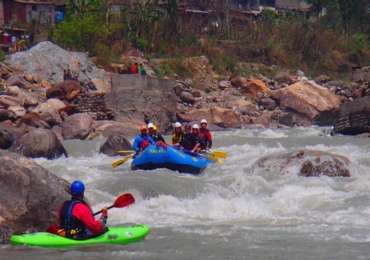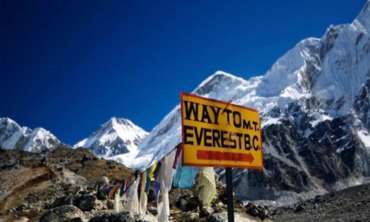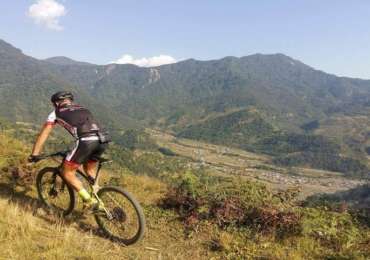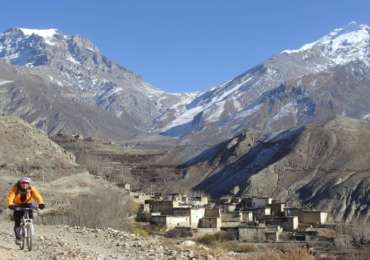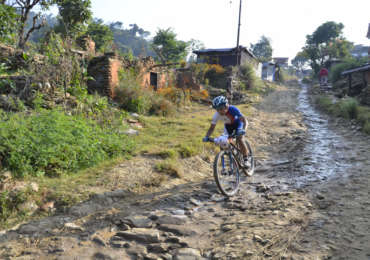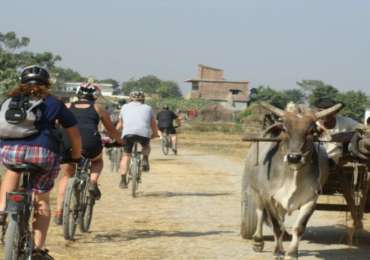When we talk about the Annapurna Base Camp, there is a sense of admiration that starts building up which leaves every trekker spellbound. There are very few treks that have this aura of making you fall in love with the landscapes and bring you closer to the base of 7,000 and 8,000-meter peaks in such a short period of time. The Annapurna Base Camp trek is one of the most popular treks in the Annapurna region. The trail is a majestic one which takes you through rice paddies, lush rhododendron forests and high altitude landscapes with the Annapurna Range looming in front of you most of the times.
The Annapurna range has such stunning mountain views which are a buffet for every mountain lover. You will also be greeted with views of Machapuchare, Annapurna South and Hiunchuli even before you set foot on the trek, which is one thing that is surely a bonus for all the trekkers. Views of different peaks of the Annapurna massif and Machapuchare will always be in the sight all the way till Sinuwa.
Day 1: Drive from Pokhara to Lower Ghandruk. Trek to Komrong.
Pokhara is the gateway to the Annapurna region. You drive from Pokhara to lower Ghandruk and trek for about an hour to reach Lower Ghandruk. Ghandruk is the biggest village you will find on the trek. You will see old stone and slate roofed houses lining the slope. You will also find a lot of tea houses spread through the entire village. This is your first introduction to the tea house culture of trekking. You will experience this throughout the trek.
Reach Pokhara on your own. We will pick you up from near the lake at 7.00 am. The exact location will be communicated to you prior to the trek.
Altitude: 7,380 ft (2,249 m)
Time taken: 2-3 hours drive to lower Ghandruk; 3 hours trek to Komrong (5 km)
Trek gradient: Moderate
Water sources: You can refill your water bottles at tea houses on the way.From Ghandruk, the trail descends gradually to Kyunri Khola (stream). Once you cross the bridge across the stream, the trail split. Take the trail on the right – this ascends steeply for about an hour to Komrong (7,380 ft).
Day 2: Komrong to Chomrung
Altitude: 7,380 ft (2,249 m) to 7,120 ft (2,170 m)
Time taken: 5-6 hours, 7 km approx.
Trek gradient: Starts with a short gradual descent for about an hour. This is followed by an ascent all the way to Chomrung.
Water sources: You can refill your water bottles at tea houses on the way.
Vegetation: Sub-tropical forest. You will predominantly find Rhododendron, fern and bamboo. Villages are lined with Banana and paddy plantations.
Komrong is located on top of a ridge. From Komrong, you can see Chomrung on the other side of the mountain, separated by Kimrong Khola. Descend from Komrong towards Kimrong. In half an hour you will cross a small stream. The trail ascends from here to reach Kimrong Khola in half an hour.
Once you cross Kimrong Khola, keep to your right. You will be following Kimrong Khola along the mountainside. The muddy trail ascends gradually. You will see Komrong on the other side now. Snow capped mountains such as Machapuchare, Annapurna South, Hiunchuli and the tip of Gangapurna gradually begin to appear. After about an hour, you will reach the first few lodges of Chomrung, at the edge of the mountain. The trail splits here – take the ascending stone steps to reach Chomrung at the top.
From the top you can again see Annapurna South, much closer now. Also visible is the entire Chomrung village, which lies on the other side of the mountain. On the opposite side you will see Sinuwa village, which you will trek through on Day 3.
Chomrung is known as the gateway to the Annapurna Sanctuary. From here, you get a grandstand view of the peaks that were visible on the trail. Do not miss the sunset view on Annapurna South from here
Chomrung, like Ghandruk, is lined with teahouses. There are also several shops that sell essentials like batteries, memory cards and toilet paper. Rest here for the day. There is a checkpost here where you need to register yourself again. Visit the office and show your TIMS card.
Day 3: Chomrung to Dovan
Altitude: 7,120 ft (2,170 m) to 8,460 ft (2,579 m).
Time taken: 6-7 hours, 10.5 km approx.
Trek gradient: Moderate-difficult. Initial descent for 20 minutes followed by a steep ascent for about an hour. Gradual ascent for half an hour followed by a steep 30 minute descent. Finish with a 2 hour ascent to Dovan.
Water sources: You can refill your water bottles at tea houses on the way.
Vegetation: Rhododendron, Oak, Bamboo and FernChomrung (7,120 ft/2,170 m) to Sinuwa (7,675 ft/2,339 m)
The trek today begins with a descent on the stone steps towards Chomrung village. Along Chomrung, for about 500 metres, you will find tea houses on either side. In 20 minutes you will reach Chomrung Khola. The last guest house before the bridge on Chomrung Khola is place-marked as Sinuwa – ignore this since Sinuwa is at least an hour away.
The trail climbs steeply on stone steps after the bridge. 15 minutes of climbing brings you to the hamlet of Tilche, which has a few houses. Another 10 minutes of trek from Tilche brings you to Lower Sinuwa. From here, the trail again climbs steeply on stone steps to reach Upper Sinuwa. This takes around 20 minutes – you can see the place as you start climbing. You will get good views of Machapuchare and Annapurna III from the viewpoint. Both Lower and Upper Sinuwa have a few lodges.
The trail to Sinuwa is lined with fields and thin forests. Beyond Upper Sinuwa (7,675 ft), you will be entering the Annapurna Sanctuary area. This is marked by dense forests and clustered tea houses. Cutting trees for firewood is prohibited. The tea houses are all powered by hydroelectric power plants. You can spot some of the small scale power plants along the trail.
Sinuwa (7,675 ft/2,339 m) to Bamboo (7,675 ft/2,339 m)
The mud trail from Sinuwa to Bamboo climbs up gradually for the first 30 minutes, till you reach a clearing. You will see an abandoned ACAP checkpost here (8,100 ft). From here, it’s a steep descent to Bamboo on stone steps for about 30 minutes.
All this while you are walking through dense forest. The Modi Khola flows alongside but you can only hear it. As you approach Bamboo you feel yourself getting closer to the source of the sound of this running river. Have lunch at one of the lodges in Bamboo.
Bamboo (7,675 ft/2,339 m) to Dovan (8,460 ft/2,579 m)
The ascent to Dovan begins immediately where the lodges of Bamboo end. Cross the wooden bridge that you will reach in 10 minutes. Climb further up for about 40 minutes till you get another wooden bridge. Dovan is 10 minutes from here, up the same trail.
This stretch is one of the most beautiful walks of the trek. The forest is dense and the climb is not too strenuous. You can stay in any of the 5 lodges in Dovan – they’re all in a single lane. Only the tip of Machapuchare is visible from Dovan.
Day 4: Dovan to Machapuchare Base Camp
Altitude: 8,460 ft (2,579 m) to 12,135 ft (3,699 m)
Time taken: 6-7 hours, 10 km approx.
Trek gradient: Moderate-difficult. Begins with a gradual ascent. Proceeds in a series of gradual and steep ascents.
Water sources: You can refill your water bottles at tea houses on the way.
Vegetation: The terrain switches from sub tropical forest to alpine. Rhododendron, Oak, Bamboo and Fern until Himalaya. Fern, Daphne and tall grass beyond Deurali.
Moonlit Machapuchare as seen from the Machapuchare base camp PC: Vivek Kumar VermaDovan (8,460 ft/2,579 m) to Himalaya (9,510 ft/2,899 m)
The trail winds slowly up from Dovan towards Himalaya. In about 10 minutes, you’ll reach a fork in the trail – take the one to the left. Cross the wooden bridge that you get in about 15 minutes and continue ascending. The path is a mix of short stretches of steep and gradual ascents. Walk past the shrine that you get on your left till you reach another fork in the trail (about an hour from Dovan).
Both routes lead to Himalaya but the mud route to the right is shorter and steeper and joins the other one 5-10 minutes later. Another 10 minutes of climbing brings you to a point where the trail opens up to the Modi Khola. Machapuchare becomes visible again here. You will also see Himalaya from here. Fifteen minutes on an undulating trail brings you to Himalaya. There are a few lodges in Himalaya in case you wish to take a break.
The trail that goes to the right from the first fork that you hit earlier today goes to a small hut. This is one of the small hydroelectric power plants which supplies electricity to surrounding villages. You are likely to find signs of past landslides and avalanches on the trail today.
Himalaya (9,510 ft/2,899 m) to Deurali (10,595 ft/3,229 m) (about 6 km from Dovan)
Climb up steadily from Himalaya for about an hour to reach an overhanging rock called Hinku cave. The entrance to the cave is blocked. From here, the trail slowly descends for 10-15 minutes till you reach two big snow patches. Cross the snow patches and one stream. Climb up for for about 20 minutes to reach Deurali. Have lunch at Deurali.
After Himalaya, the terrain starts to shift from dense forest to alpine boulder. The only vegetation you find are Bamboo, Ferns and grass. You will be climbing up and down small boulders on a large part of the trail.
Deurali (10,595 ft/3,229 m) to Machapuchare Base Camp (12,135 ft/3,704 m) (about 4 km)
It’ll take you 10 minutes of climbing through boulders to cross the last lodge at Deurali. From here, the trail opens up to the valley with Modi Khola thundering past next to you. You will see Machapuchare and Gangapurna in the distance.
Keep walking ahead till you reach descending stone steps leading to Bagar in about 40 minutes. Continue past the abandoned lodges here and climb steadily up from for about 1 hour. You will reach a bridge and cross Modi Khola. MBC is 20-30 minutes from here, up steep steps. Soak in the magnificent views of Machapuchare (22,955 ft) in front and Annapurna to your left.
The terrain on this stretch is marked with small snow bridges that need to be crossed. You are also entering grasslands, marked with few Daphne trees. Small flowering plants adorn the trail with their colours. The mountains on either side are rocky. Small waterfalls flow from either side into Modi Khola. This is also marked as an avalanche prone area.
You will be ascending close to 4,000 ft. Watch out for signs of AMS. Make sure you don’t rush through the trail – walk slowly to help your body acclimatise.
Day 5: Machapuchare Base Camp to Annapurna Base Camp
Altitude: 12,135 ft (3,704 m) to 13,550 ft (4,130 m)
Time taken: 2 hours, 3.5 km approx.
Trek gradient: Moderate. Steep ascent in the beginning for about 1 km after which the trail ascends gradually to reach ABC.
Water sources: You can refill your water bottles at tea houses on the way.
Vegetation: Alpine terrain with grasslands on rocky mountains.First light at dawn on the Annapurna range as seen from Annapurna Base Camp
Start early from Machapuchare Base Camp. The peaks glowing with the golden and orange tints of sunrise are a must watch. ABC is about 90 degrees to the left of the direction you came in to Machapuchare Base Camp.
The initial 1 km is a steep ascent. Then the trail ascends gradually. As you walk, you will see sunrise hit Annapurna I and slowly extend towards Annapurna South. The last stretch to ABC is a walk on moraines. If you are lucky, you can spot some Marmut on the way to ABC.
You gare surrounded by mountains at ABC. Annapurna I, Annapurna III, Annapurna South, Gangapurna, Gandharvachuli and Machapuchare are right there in front of you. Pick a spot at the edge of the Annapurna glacier and soak in the views.
Day 6: ABC to Bamboo
Altitude: 13,550 ft (4,130 m) to 7,675 ft (2,339 m)
Time taken: 8-9 hours, 15.5 km approx.
Trek gradient: Moderate-difficult. Mix of steep and gradual descent, tracing the same route back.
Water sources: You can refill your water bottles at tea houses on the way.
This is perhaps the longest day of the trek. You will be tracing back the same route you took to reach ABC all the way to Bamboo – crossing MBC, Deurali, Himalaya and Dovan. Today’s trek includes long stretches of steep descent interspersed with short ascents. Himalaya is good place to stop for lunch.
Day 7: Bamboo to Jhinu
Altitude: 7,675 ft (2,339 m) to 5,770 ft (1,759 m)
Time taken: 6-7 hours, 10 km approx.
Trek gradient: Moderate-difficult. Steep ascent for about 45 minutes followed by steep descent for about 2 hours. Another steep descent for about 45 minutes followed by a steeply descending trail all the way.
Water sources: You can refill your water bottles at tea houses on the way.
Take the trail to Sinuwa and begin climbing up steep steps till you reach the abandoned check post. This should take you around 45 minutes. Descend from here till Sinuwa fo about 45 minutes. From Sinuwa, it’s a hard descent to Chomrung Khola for about an hour followed by a steep ascent to Chomrung for about 45 minutes.
Checkout from the ACAP office at Chomrung before you leave.
Take the ascending trail from Chomrung up to the fork with the signpost for Juini. This should take you about 5 minutes. Descend on the steep steps to reach Jhinu in 1.5-2 hours.
The view of the sub tropical forests from Jhinu is one of the best. Jhinu faces Modi Khola and is famous for hot springs. Enjoy a nice bath here.
Day 8: Jhinu to Syauli Bazaar; leave for Pokhara
Altitude: 5,770 ft (1,759 m) to 3,740 ft (1,140 m)
Time taken: 4 hours trek, 6 km approx. + 2-3 hours drive to Pokhara, 45 km approx.
Trek gradient: Easy-moderate. Steep descent for about 30 minutes followed by gradual ascent.
Water sources: You can refill your water bottles at tea houses on the way.
Vegetation: Mix of terraced farms along villages to dense forest along the way.Take the steeply descending trail from Jhinu to reach the bridge at Kimrong Khola in about 30 minutes. After crossing the bridge, take the trail to the left. The ascending trail to the right goes to Somrong. Keep walking along the houses on the trail straight ahead. You will reach New Bridge in about an hour. This stretch of the trail is a mix of gradual and steep ascents. Many different kinds of butterflies thrive in this region, below 5,000 ft. So, you will have a colourful display of these as you reach lower from Jhinu.
Continue on the trail from New bridge. Within 5 minutes you see a fork to Landruk on the left and to Kyumi on the right. Take the trail to Kyumi. After about 20 minutes on this undulating trail, you will reach a small village, Uppu Dandu. Take the descending stone steps from here to reach Kalchane in another 20 minutes. You will find a couple of tea houses here.
The trail from Kalchane forks again in about 10 minutes. Take the route to Kyumi – to the left and descending. Keep to the right on this trail. You will reach Kyumi in about 20 minutes. Kyumi is a small, quaint village with 5 tea houses. Have lunch here.
From Kyumi, take the ascending trail towards Ghandruk. You will hit a fork within 5 minutes – take the trail to Birethanti and reach the roadhead in about 45 minutes. This is Syauli Bazaar. This is where the trek ends. If you’re traveling on your own, regular buses and jeeps to Pokhara can be boarded here.
| City | Night (s) | Hotels / Lodges / Camp |
| Komrong | 01 | Camp |
| Chomrung | 01 | Camp |
| Dovan | 01 | Camp |
| Machapuchare BC | 01 | Camp |
| Annapurna BC | 01 | Camp |
| Bamboo | 01 | Camp |
| Jhinu | 01 | Camp |
Day 1 and 9 Hotel in Pokhra.
Day2 to 8 Teahouse.
Private Transport: (According to Itinerary) Pokhra to Nayapul and return.
1 English Speaking Guide.
Assistant Guide.
All meals during trek: (As per the itinerary)
Day 2 Lunch to Day 9 Lunch
All necessary permits and entry fees.
TIMS card.
High-altitude sleeping bag.
First aid medical kits, oxygen cylinder.
Store room facility in Pokhra for extra luggage.
Insurance of Trekking Guide and porters.
Services from Pokhra to Pokhra.
– Any kind of personal expenses.
– International air fares
– Porters for the personal bag*
– Wifi, charging batteries and hot showers
– Nepal entry visa (approximately $40 USD) only for foreigners (Not for Indian)
– Customary gratuities for guides & porters
– Unforeseen cost due to flight cancellation, weather conditions etc
– Evacuation and medical expanses*
– Drinks: We don’t include drinking water on the trek which you can buy a number of places for between $1 and $3 a bottle (it gets more expensive towards base camp). A better solution is to buy water tablets in Kathmandu/Pokhra for around $2 and treat the water (your guide can help you find the good places to fill your water bottle)
– Travel Insurance: We require some travel insurance. I suggest to get travel insurance from World Nomads it should be around $100 per/person and covers the helicopter evacuation and medical.
– Accommodation in good hotels.
– Check-in / out time is 12 noon at most of the hotels.
– Extension to other places is also possible with a minimal extra cost.
– Additional nights are available at each place with minimal supplement.
– A visa is required and must be obtained prior to your departure from your Country.
– If quoted hotel is not available, we will provide one of a similar category and standard.
– Small deviations in the tour program are sometimes necessary, depending on weather, road conditions, flight schedules and room availability.
– In case the government changes presently applicable taxes, increase in airlines prices, fuel surcharge our rates will need to be adjusted accordingly.
– Sometimes, there is no relevance between the distance and time of travelling, as it depends upon the condition of the roads and congestion of the traffic.
– While every effort will be made to maintain the itinerary, in view of local strikes etc that are beyond our control all schedule and itineraries are subject to last moment changes.
– Clients must be fully insured, as the company cannot accept liability for loss or damage to client’s property, medical emergencies or any other loss suffered by them whilst on tour.
– In Case of issuing Domestic or International air tickets, SGV is not responsible for any refund if the flight is delayed or cancelled, as it is the responsibility of airline.



